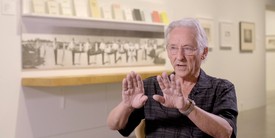About
There are things that I’m constantly looking at that I feel should be elevated to greater status, almost to philosophical status or to a religious status. That’s why taking things out of context is a useful tool to an artist. It’s the concept of taking something that’s not subject matter and making it subject matter.
—Ed Ruscha
At the start of his artistic career, Ed Ruscha called himself an “abstract artist ... who deals with subject matter.” Abandoning academic connotations that came to be associated with Abstract Expressionism, he looked instead to tropes of advertising and brought words—as form, symbol, and material—to the forefront of painting. Working in diverse media with humor and wit, he oscillates between sign and substance, locating the sublime in landscapes both natural and artificial.
In 1956, Ruscha moved from Oklahoma City to Los Angeles, where he attended the Chouinard Art Institute. During his time in art school, he had been painting in the manner of Franz Kline and Willem de Kooning, and came across a reproduction of Jasper Johns’s Target with Four Faces (1955). Struck by Johns’s use of readymade images as supports for abstraction, Ruscha began to consider how he could employ graphics in order to expose painting’s dual identity as both object and illusion. For his first word painting, E.Ruscha (1959), he intentionally miscalculated the space it would take to write his first initial and surname on the canvas, inserting the last two letters, HA, above and indicating the “error” with an arrow. After graduation, Ruscha began to work for ad agencies, honing his skills in schematic design and considering questions of scale, abstraction, and viewpoint, which became integral to his painting and photography. He produced his first artist’s book, Twentysix Gasoline Stations—a series of deadpan photographs the artist took while driving on Route 66 from Los Angeles to Oklahoma City—in 1963. Ruscha since has gone on to create over a dozen artists’ books, including the 25-foot-long, accordion-folded Every Building on the Sunset Strip (1966) and his version of Kerouac's iconic On the Road (2009). Ruscha also paints trompe-l’oeil bound volumes and alters book spines and interiors with painted words: books in all forms pervade his investigations of language and the distribution of art and information.
Ruscha’s paintings of the 1960s explore the noise and the fluidity of language. With works such as OOF (1962–63)—which presents the exclamation in yellow block letters on a blue ground—it is nearly impossible to look at the painting without verbalizing the visual. Since his first exhibition with Gagosien in 1993, Ruscha has had twenty-one solo exhibitions with the gallery, including Custom-Built Intrigue: Drawings 1974–84 (2017), comprising a decade of reverse-stencil drawings of phrases rendered in pastel, dry pigment, and various edible substances, from spinach to carrot juice. The first retrospective of Ruscha’s drawings was held in 2004 at the Whitney Museum of American Art. Ruscha continues to influence contemporary artists worldwide, his formal experimentations and clever use of the American vernacular evolving in form and meaning as technology and internet platforms alter the essence of human communication. Ruscha represented the United States at the 51st Venice Biennale (2005) with Course of Empire, an installation of ten paintings. Inspired by nineteenth century American artist Thomas Cole’s famous painting cycle of the same name, the work alludes to the pitfalls surrounding modernist visions of progress. In 2018 Ruscha’s Course of Empire was presented concurrently with Cole’s at the National Gallery in London.

Photo: Leo Holub/Archives of American Art/Smithsonian Institution, Washington, DC
#EdRuscha
Website
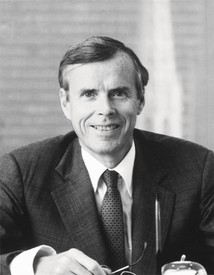
Donald Marron
Jacoba Urist profiles the legendary collector.
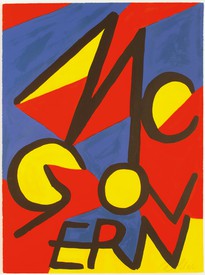
The Art History of Presidential Campaign Posters
Against the backdrop of the 2020 US presidential election, historian Hal Wert takes us through the artistic and political evolution of American campaign posters, from their origin in 1844 to the present. In an interview with Quarterly editor Gillian Jakab, Wert highlights an array of landmark posters and the artists who made them.
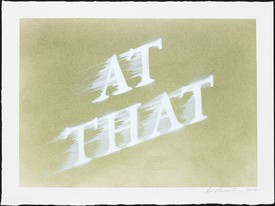
“Things Fall Apart”: Ed Ruscha’s Swiped Words
Lisa Turvey examines the range of effects conveyed by the blurred phrases in recent drawings by the artist, detailing the ways these words in motion evoke the experience of the current moment.
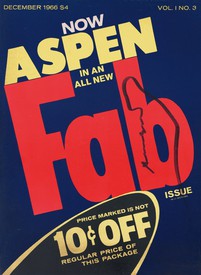
Artists’ Magazines
Gwen Allen recounts her discovery of cutting-edge artists’ magazines from the 1960s and 1970s and explores the roots and implications of these singular publications.
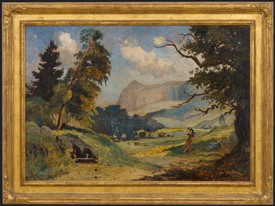
Eilshemius and Me: An Interview with Ed Ruscha
Ed Ruscha tells Viet-Nu Nguyen and Leta Grzan how he first encountered Louis Michel Eilshemius’s paintings, which of the artist’s aesthetic innovations captured his imagination, and how his own work relates to and differs from that of this “Neglected Marvel.”
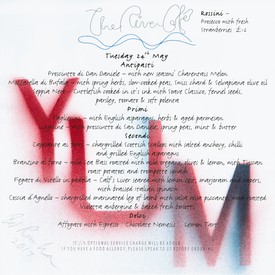
The River Café Cookbook
London’s River Café, a culinary mecca perched on a bend in the River Thames, celebrated its thirtieth anniversary in 2018. To celebrate this milestone and the publication of her cookbook River Café London, cofounder Ruth Rogers sat down with Derek Blasberg to discuss the famed restaurant’s allure.
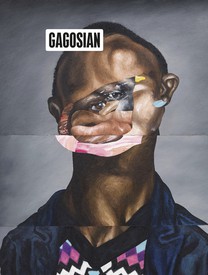
Now available
Gagosien Quarterly Fall 2019
The Fall 2019 issue of Gagosien Quarterly is now available, featuring a detail from Sinking (2019) by Nathaniel Mary Quinn on its cover.
Ed Ruscha: A Long Way from Oklahoma
In conjunction with his exhibition VERY at Louisiana Museum of Modern Art in Humlebæk, Denmark, Ed Ruscha sat down with Kasper Bech Dyg to discuss his work.
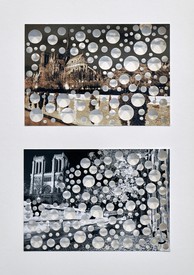
For Notre-Dame
An exhibition at Gagosien, Paris, is raising funds to aid in the reconstruction of the Cathédrale Notre-Dame de Paris following the devastating fire of April 2019. Gagosien directors Serena Cattaneo Adorno and Jean-Olivier Després spoke to Jennifer Knox White about the generous response of artists and others, and what the restoration of this iconic structure means across the world.

Veil and Vault
An exhibition at the Broad in Los Angeles prompts James Lawrence to examine how artists give shape and meaning to the passage of time, and how the passage of time shapes our evolving accounts of art.

Course of Empire
Ed Ruscha sat down with Tom McCarthy and Elizabeth Kornhauser, curator at the Metropolitan Museum of Art, to discuss the nineteenth-century artist Thomas Cole, whose Course of Empire paintings inspired a series of works by Ruscha more than a century later.
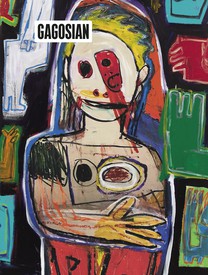
Gagosien Quarterly Winter 2018
The Winter 2018 issue of Gagosien Quarterly is now available. Our cover this issue comes from High Times, a new body of work by Richard Prince.
Fairs, Events & Announcements
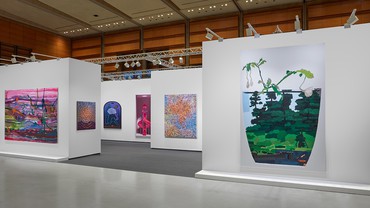
Art Fair
Frieze Seoul 2023
September 7–9, 2023, booth C14
COEX, Seoul
www.frieze.com
Gagosien is pleased to participate in Frieze Seoul 2023 with a presentation of contemporary works by gallery artists, including Derrick Adams, Georg Baselitz, Dan Colen, Edmund de Waal, Jadé Fadojutimi, Urs Fischer, Cy Gavin, Mehdi Ghadyanloo, Nan Goldin, Katharina Grosse, Jennifer Guidi, Thomas Houseago, Alex Israel, Rick Lowe, Takashi Murakami, Nam June Paik, Giuseppe Penone, Ed Ruscha, Alexandria Smith, Anna Weyant, Stanley Whitney, Jonas Wood, and Richard Wright, among others.
Coinciding with the fair is the arrival of Jiyoung Lee, who was recently appointed to lead the gallery’s operations in Korea. Lee joins Gagosien following nearly fifteen years based in Seoul working on behalf of both Korean and Western galleries. Her appointment builds on the gallery’s establishment of a business entity in Korea last year, and provides for expanded activities in the region.
Gagosien’s booth at Frieze Seoul 2023. Artwork, left to right: © Jadé Fadojutimi, © Jen Guidi, © Alexandria Smith, © Mehdi Ghadyanloo, © Rick Lowe Studio, © Jonas Wood, Photo: Sebastiano Pellion di Persano
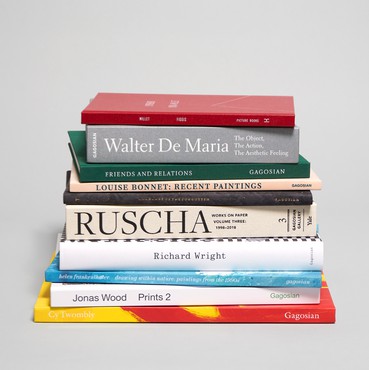
Book Fair
Acid-Free Los Angeles Art Book Market 2023
June 16–18, 2023, table A05
Blum & Poe, Los Angeles
acid-free.info
Gagosien is participating in the Acid-Free Los Angeles Art Book Market, which is organized by a collective of Los Angeles–based independent publishers. Now in its third year, the three-day fair brings together over ninety exhibitors to present new books and projects and foster meaningful conversations around art publishing. To celebrate the recent release of its six hundredth title, the gallery will offer six hundred Gagosien publications for $10 each, including books on West Coast artists Jennifer Guidi, Ed Ruscha, and Jonas Wood, among others. The fair is free to attend.
A selection of recent Gagosien publications

Auction
Printed Matter
Spring Benefit Auction
May 24–June 8, 2023
This online benefit auction for Printed Matter features over sixty donated artworks—some of which were created especially for the fundraiser—by contemporary artists, including Richard Artschwager, Piero Golia, Adam McEwen, Richard Prince, Ed Ruscha, Taryn Simon, and Jonas Wood. Proceeds from the auction, which is hosted by Artsy, will support the nonprofit organization’s mission to further the distribution, understanding, and appreciation of artist’s books and related publications.
Piero Golia, The Best Is Yet to Come, 2020 © Piero Golia
Museum Exhibitions

On View
ED RUSCHA / NOW THEN
Through January 13, 2024
Museum of Modern Art, New York
www.moma.org
Spanning sixty-five years of Ed Ruscha’s remarkable career and mirroring his own cross-disciplinary approach, the exhibition features over 250 works, produced between 1958 and the present. Including painting, drawing, prints, film, photography, artist’s books, and installation, the works are displayed according to a loose chronology throughout the sixth-floor galleries of the Museum of Modern Art, New York. Alongside the artist’s most acclaimed works, the exhibition highlights lesser-known aspects of his practice, offering new perspectives and underlining Ruscha’s role as a keen observer of our rapidly changing world.
Installation view, ED RUSCHA / NOW THEN, Museum of Modern Art, New York, September 10, 2023–January 13, 2024. Artwork © Ed Ruscha. Photo: Jonathan Dorado

Closed
13 Women
October 8, 2022–August 27, 2023
Orange County Museum of Art, Costa Mesa, California
ocma.art
13 Women marks the Orange County Museum of Art’s sixtieth anniversary; by paying homage to the thirteen women who founded the Balboa Pavilion Gallery, the OCMA’s predecessor institution, which was opened in 1962. The exhibition presents work from the 1960s to the present by the artists central to the museum’s collection, including Chris Burden and Ed Ruscha.
Chris Burden, Large Glass Ship, 1983, Orange County Museum, Costa Mesa, California © 2022 Chris Burden/Licensed by the Chris Burden Estate and Artists Rights Society (ARS), New York

Closed
Strike Fast, Dance Lightly
Artists on Boxing
June 16–August 11, 2023
FLAG Art Foundation, New York
www.flagartfoundation.org
Copresented with The Church, Sag Harbor, New York, Strike Fast, Dance Lightly: Artists on Boxing, is a two-venue group exhibition that centers on the psychology, ethos, and spectacle of boxing. It explores the sport as both theme and metaphor, together with its complex and multifaceted cultural meanings. The exhibition includes ancient, modern, and contemporary artworks, as well as newly commissioned pieces and boxing-related ephemera. Work by Amoako Boafo and Ed Ruscha is included.
Installation view, Strike Fast, Dance Lightly: Artists on Boxing, FLAG Art Foundation, New York, June 16–August 11, 2023. Artwork, left and right: © Rosalyn Drexler, center: © Amoako Boafo. Photo: Steven Probert

Closed
Motion
Autos, Art, Architecture
April 8–September 18, 2022
Guggenheim Bilbao, Spain
www.guggenheim-bilbao.eus
Motion. Autos, Art, Architecture celebrates the artistic dimension of the automobile and links it to the parallel worlds of painting, sculpture, architecture, photography, and film. The exhibition brings together nearly forty automobiles that are placed center stage in the galleries and surrounded by significant works of art and architecture. Work by Alexander Calder, Christo, Andreas Gursky, Ed Ruscha, and Andy Warhol is included.
Installation view, Motion. Autos, Art, Architecture, Guggenheim Bilbao, Spain, April 8–September 18, 2022. Artwork © Ed Ruscha. Photo: courtesy Guggenheim Museum Bilbao


















![Ed Ruscha, Brave Men Run in My Family [#1], 1988 Acrylic on paper, 60 ⅛ × 40 1¼ inches (152.7 × 102.2 cm)© Ed Ruscha](/images/OxHXy43SwsAg_585x329.jpg)
















































